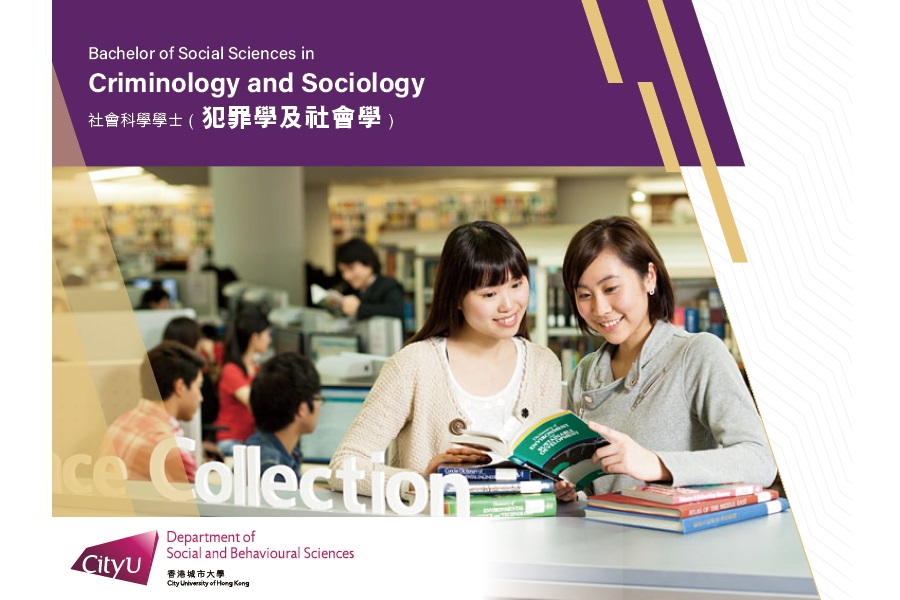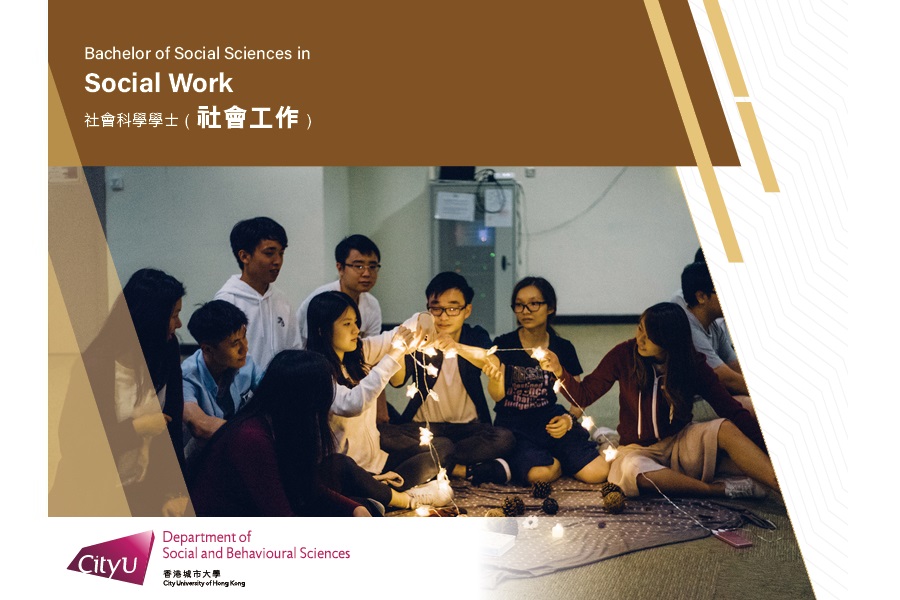BSocSc Criminology and Sociology

1358A
Local Places:
20 (For First Year and Advanced Standing I Entries)* and
70 (For Senior Year Entry)
Non-Local Places
(For Overall Direct Applications):
Around 300
2 Years (For Senior Year Entry)
* for JUPAS and non-JUPAS admissions
This major aims to equip degree-level graduates with broad knowledge of criminology and sociology; and with professional competence to conduct criminological and sociological research to solve problems at the organizational, community, societal, national, and international levels, with a particular interest in protecting the public and maintaining Hong Kong's status as one of the safest cities in the world. Students will acquire knowledge and skills necessary to undertake managerial and executive responsibilities in a wide range of professions, including policing, crime prevention, security services, correctional services, conflict resolution, social analysis, societal planning, marketing research, and the operation of non-governmental organisations. Ample opportunities are provided for students to develop an interest in discovery and innovation to benefit society through crime control and reduction, and societal development and improvement through the application of various sociological practices.
This is the only UGC-funded undergraduate programme in Hong Kong to provide comprehensive training in the disciplines of Criminology and Sociology.
Entrance Requirements for Direct / Non-JUPAS Applicants
To be considered for admission, you must satisfy the General Entrance Requirements.
For senior-year (Advanced Standing II) admission, applicants are normally expected to have completed an Associate Degree/Higher Diploma with a Cumulative Grade Point Average (CGPA) of ≥3.0 or an equivalent overall mark, or a credit award.
For details of the programme’s curriculum structure, please visit the ‘Undergraduate Catalogue’.
Upon successful completion of this major, students should be able to:
- describe a range of key concepts, theories and professional values in criminology and applied sociology;
- identify and criticise the underlying assumptions of and devise interventions to address social problems and criminal issues with a particular interest in different types of informal and formal strategies;
- apply qualitative and quantitative research methods and use different sociological and criminological perspectives to explain social problems and crimes;
- evaluate the applicability of sociological and criminological theories and develop innovative ideas for preventing crimes and creative ways of reducing re-offending in the local context;
- evaluate the function and operation of social institutions and law enforcement agencies in the criminal justice system;
- conduct independent research; analyse the impacts of social, technological, and environmental changes on individuals and society; present research findings clearly and systematically to the public; and provide creative suggestions and/or solutions for preventing crimes and other social problems; and
- design programmes, generate alternatives, invent ideas, and construct cost-effective means for sustaining social order and safety.
Students in this major will be able to take a certain number of courses in both criminology and sociology and will thus have a broadened exposure to theories and skills training in both disciplines. This broad knowledge base will surely strengthen the employability of graduates. Sample areas of employment for our graduates include positions in law enforcement agencies (e.g. Hong Kong Police Force, Correctional Services Department, Customs and Excise Department, Immigration Department, and Fire Services), schools and universities, non-governmental organisations, security or risk management departments in private companies, research institutes and marketing research firms, media industries, and public relations firms.
-
BSocSc Social Work

1303A
Local Places:
27 (For First Year and Advanced Standing I Entries)*
Non-Local Places
(For Overall Direct Applications):
Around 300
* for JUPAS and non-JUPAS admissions
The Bachelor of Social Sciences in Social Work (BSSSW) programme is a helping professional degree that is accredited by the Social Workers Registration Board (SWRB) to promote human and community well-being, with a commitment to upholding human dignity, social equality, and diversity. The programme aims to enable students to evaluate and align personal values with the value base of the social work profession, and acquire knowledge, skills, understanding and practice competence in the profession. Throughout the course of study, students will receive solid foundation training in social sciences and social work. Prior to integrating classroom learning into real life practice through two fieldwork placements, students will undergo rigorous theoretical and laboratory training in the classroom. With elective courses concentrated in specific target groups and different working approaches, students can develop specializations in specific areas. To enable students with a breadth of knowledge to successfully navigate the challenges of the 21st century, they will also be exposed to multiple disciplines through gateway education (GE) and college specified courses offered by the University. To cultivate students as ideal graduates who are globally-minded, critical and innovative, civically- oriented with effective communication skills, this programme encourages students to work alongside faculty members in research and action learning projects, both locally or overseas.
Uniqueness of the programme
The programme integrates a liberal arts perspective to enrich students’ understanding of the person-in-environment context of professional practice, with a critical analysis and assessment of interpersonal, bio-psycho-social, cultural, and environmental factors. By explaining the use of comparative theories to work with individuals, families, groups, organizations, and communities, and applying the knowledge and skills of generalist social work practice with systems of all sizes, students can become competent, reflective, and ethical social work practitioners, capable of carrying out well-prepared professional practice for diverse clients and social groups. Upon completing the BSSSW programme, students are qualified to become registered social workers.
Entrance Requirements for Direct/Non-JUPAS Applicants
To be considered for admission, you must satisfy the General Entrance Requirements.
An admission interview is required for applicants to the Social Work major. Interview priority will be given to applicants who have exhibited promising performance in public examinations and/or extra-curricular activities. Strong evidence of your personal qualities, community participation and sustained involvement in extra-curricular and co-curricular activities are desirable to support your application.
Our programme looks for students who have leadership, social awareness, maturity and with volunteer service experiences. The prerequisites required for admission to Social Work major are two: all applicants have to (1) produce a personal statement; (2) attend an interview hold by the Department.
For details of the programme’s curriculum structure, please visit the ‘Undergraduate Catalogue’.
This major enables students to evaluate and align their personal values with the value base of the social work profession, and to acquire knowledge, skills, understanding and competence in reflective professional practice. Upon successful completion of this major, student should be able to:
- evaluate and align their personal values with the value base of the profession and its ethical standards and principles, and practise accordingly;
- integrate the liberal arts perspective that enriches understanding of the person-in-environment context of professional practice with critical analysis and assessment of interpersonal, bio-psycho-social, cultural and environmental factors;
- explain the use of comparative theories of working with individuals and families, groups, organisations and communities;
- use communication skills differentially and creatively across client populations, colleagues and communities;
- apply the knowledge and skills of generalist social work practice with systems of all sizes and integrate new ideas into practice;
- demonstrate the skills to practice without discrimination, with respect and knowledge of clients’ characteristics, cultural beliefs and contexts;
- apply critical thinking skills within the context of professional social work practice;
- describe the forms and mechanisms of oppression and discrimination and apply advocacy and social change strategies that advance social and economic justice;
- conduct research studies and evaluate and apply research findings to provide creative solutions to practice within the community, with an aim to engage in evidence-based practice; and
- demonstrate knowledge, understanding and competence in practice through reflection to accomplish discovery and innovation in social work practice.
Based on its learning objectives, this major has the following main components:
- College Core Courses
- Social Work Core Courses
- Social Work Elective Courses
- Concurrent Practicum
For details of the programme’s curriculum structure and the course list, please visit the ‘Undergraduate Catalogue’.
Upon graduation, you will have the competence to practise as a professionally qualified social worker in a variety of settings through which human services are delivered (e.g. social services agencies, schools and health care institutions); work in the field of human resources (e.g. customer service and staff training); or pursue further studies in social work or related fields (e.g. psychology and education). You will also be eligible to apply for social work positions as a Registered Social Worker (RSW) in government and non-government organisations.
Graduates are qualified to register with the Social Workers Registration Board as Registered Social Workers (RSW). This qualification is recognised by the majority of societies throughout the world.
- Since 2015, 10 full-time undergraduate social work students are awarded HKD 25,000 each under the HSBC Social Work Scholarship Scheme every year.
- Students with outstanding academic performance can apply for non-local fieldwork placement at other countries/cities, such as United States, Canada, Australia, Singapore, etc.
- Access to a rich array of co-curricular activities, such as student exchanges, summer internships, study tours, volunteer services and other whole person development activities, and the like.
- Opportunities to work alongside teachers in research and action learning projects locally or overseas.
- Minor studies in psychology, applied sociology and criminology are offered to students within the Department.
- Minor studies in disciplines outside the Department are also offered to students.
On a selective basis
- Late February to early March 2024
- Group interview (1 hour)
- English and Chinese
Pagination
- Page 1
- Next page